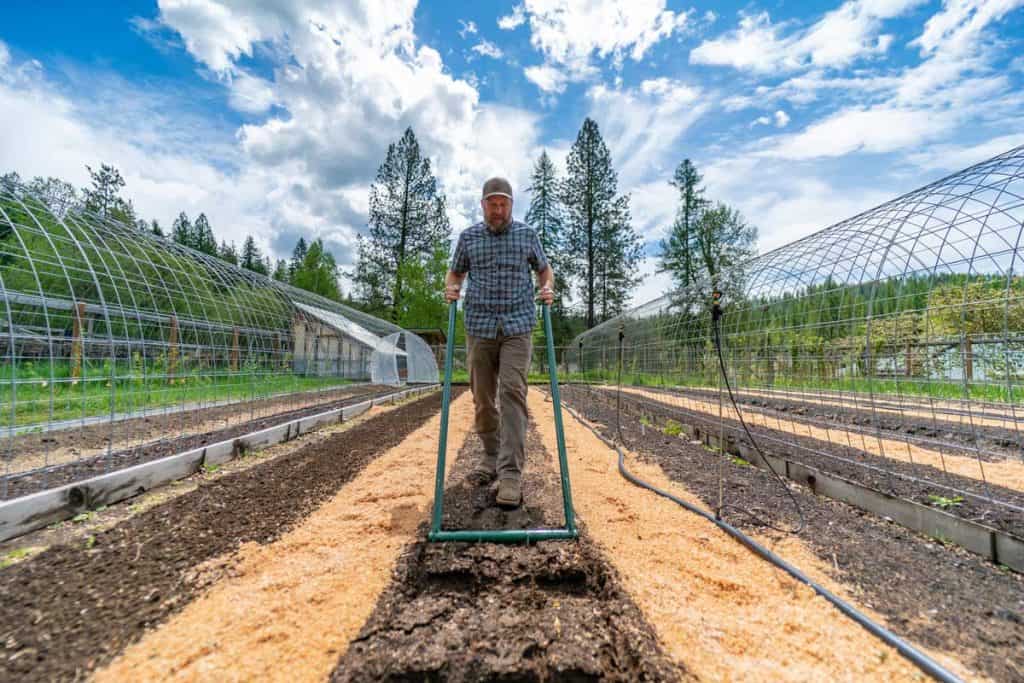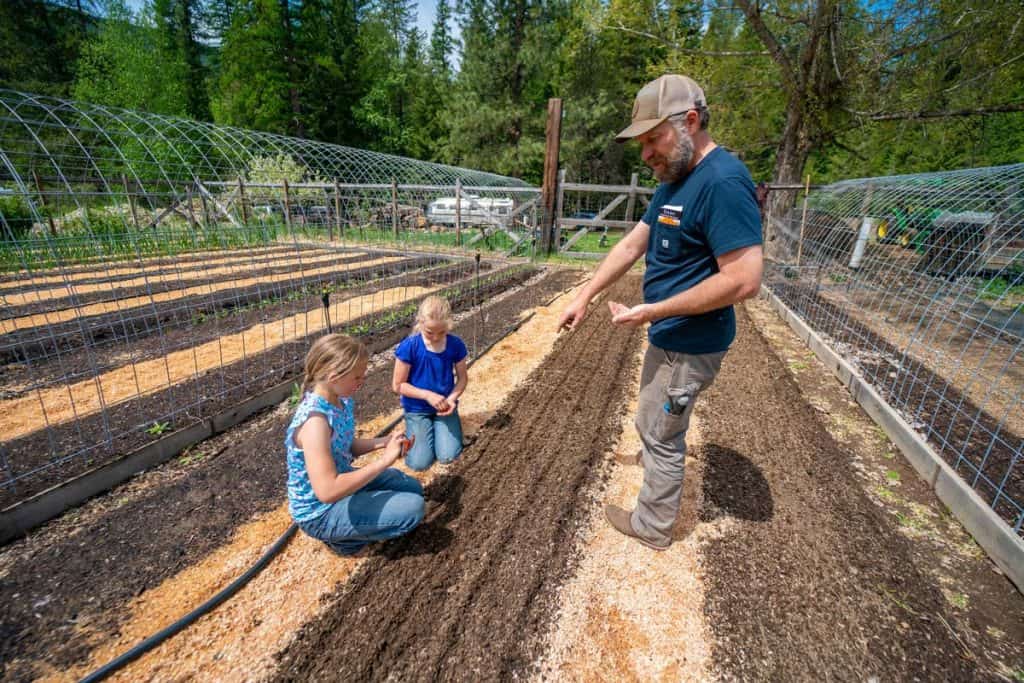For the longest time, I struggled with consistent germination of my carrot seeds. That is, until I learned this trick that made growing carrots much more successful, with germination rates that were almost 10 times higher year after year. Here are some tips on how to plant carrots so that you can eat them fresh all year long and have a lot to store in the winter.
This post was first published in June 2021. It has since been updated with information on how to thin your carrot plants so that you can grow twice as many in the same amount of space.
You can be sure that almost all of your carrot seeds will grow every time if you follow this tip. You can then enjoy fresh carrots, carrot top pesto, and homemade fermented ginger carrots!
People often have a lot of trouble with carrots because they are hard to germinate and get trees to grow out of the ground. In this post, I’m sharing my tried and true method for how to plant carrot seeds.
Soaking carrot seeds before planting is a technique used by some gardeners to try to improve germination rates and seedling growth. But is it really necessary or beneficial? In this comprehensive guide, we’ll examine the pros and cons of soaking carrot seeds to help you decide if it’s right for your garden.
What Happens When You Soak Seeds?
When you soak seeds in water, it initiates the germination process. The seed coat absorbs water and becomes softer. This kickstarts the growth of the radicle, or embryonic root, as the seed prepares to sprout.
Soaking seeds before planting essentially gives them a head start on germination. The idea is that soaked seeds will be primed and ready to sprout quickly once planted in the ground.
Potential Benefits of Soaking Carrot Seeds
Here are some of the main benefits that soaking can provide for carrot seeds:
-
Faster germination: By softening the seed coat, soaking allows seeds to imbibe water more readily and speeds up germination. This can be especially helpful in cooler soil temperatures.
-
Earlier seedlings Soaked seeds get a jumpstart on growth so seedlings may emerge faster. This can translate to earlier harvests.
-
Better germination rates Some gardeners report higher germination rates from soaking, particularly in challenging soil conditions.
-
Improved seed-soil contact Soaking makes seeds swell and become stickier, helping them make better contact with surrounding soil
-
Stronger seedlings: Faster emergence can mean healthier, more resilient seedlings that better withstand stresses.
Potential Drawbacks of Soaking Seeds
However, there are also some potential downsides to soaking carrot seeds to consider:
-
Not always necessary: Modern treated seeds germinate readily without soaking, especially in warm soils.
-
Risk of rotting: Soaked seeds left in wet, warm conditions can rot before sprouting.
-
Seed clumping: Soaked seeds may stick together and need to be carefully separated before planting.
-
Extra time required: Soaking requires an extra time commitment upfront before planting.
-
Variable results: Some varieties or individual seeds may respond better to soaking than others.
-
Difficulty gauging ideal time: It can be tricky to gauge the optimal soaking duration before overdoing it.
Best Practices for Soaking Carrot Seeds
If you do choose to soak your carrot seeds, follow these tips for success:
- Soak seeds for 12-24 hours – excessive soaking can cause harm.
- Use cool, clean water – avoid warm water that promotes rotting.
- Place seeds in a container allowing drainage to prevent waterlogging.
- Gently agitate seeds periodically while soaking to separate.
- Rinse thoroughly after soaking to prevent sticking and remove residue.
- Plant soaked seeds quickly – don’t leave them wet for long.
- Consider lowering seeding rate to account for swelling during soaking.
- Experiment with different durations to find what works best for your conditions.
- Focus on older or untreated seeds – fresh treated seeds don’t need soaking.
Alternative Options to Soaking
If you decide against soaking, here are a couple alternative options:
-
Seed priming: This involves soaking seeds in a salt solution, then rinsing and drying them before planting. It provides controlled hydration.
-
Bio-priming: Coating seeds with beneficial microbes before planting can aid germination without soaking. Look for bio-priming products.
-
Direct sowing: Modern treated carrot seeds often germinate fine when directly sown without any pre-treatment.
When to Soak Carrot Seeds
The decision of whether to soak carrot seeds depends largely on your soil conditions:
-
Soaking can help in cool, wet soils early in the season to boost germination.
-
It likely provides little benefit in warm, moist soils where carrot seeds will germinate readily.
-
Dry soils where maintaining moisture is difficult are also good candidates for soaking before planting.
-
Mid-late season plantings may benefit more than spring sowings.
Take into account your individual environment and soil to decide if soaking is warranted or unnecessary.
The Verdict: To Soak or Not to Soak?
To summarize the key points:
-
Soaking can provide benefits like faster germination and stronger seedlings.
-
But it also poses risks like rotting and isn’t always needed for good results.
-
Make sure to use proper soaking techniques and conditions if you do soak.
-
Consider alternatives like seed priming or bio-priming instead.
-
Direct sowing without pre-treatment often works well for many situations and gardeners.
There’s no universally right or wrong answer regarding soaking carrot seeds. Assess your unique conditions and gardening approach to make the decision. A small experiment testing soaked vs. unsoaked seeds can help inform your practices.
While soaking seeds is not mandatory or a magic bullet, it may provide a slight advantage in some circumstances. But with proper planting techniques and soil preparation, a successful carrot crop is certainly achievable without any pre-treatment of the seeds.
Follow these research-backed recommendations, weigh the pros and cons, and ultimately choose the seed sowing method you feel will work best for your garden!
How Long Do Carrots Take to Germinate?
Carrots have a long germination time, sometimes taking up to three weeks. Because of this, it’s easy to forget to water for too long, letting the soil dry out and stopping or slowing the seeds from germinating.
It will stay moist longer if you put a slightly thicker layer of soil over your carrot seeds. This will make it less likely that the seeds will move, get blown away, or be washed away.
How to Plant Carrots From Seed
I find it helpful to make rows before going through and placing the seeds into the ground. I use four pieces of PEX tubing and space them out evenly on the tines of my landscape rake. I put carrots in rows that are about 6 to 8 inches apart. There are 4 rows in my 30-inch beds.
One easy pass along the garden bed row and my four individual rows for carrot seeds are ready.
Mark the rows ahead of time if you’re using more than one type of carrot seeds. That way, you won’t get lost later trying to figure out which type is where!
How to Sow Carrots Seeds (The simple trick to good germination every time!) | Gardening Tips
FAQ
What is the fastest way to germinate carrot seeds?
How many hours should you soak seeds before planting?
Can you just scatter carrot seeds?
Do carrots need darkness to germinate?
How do I ensure germination of carrot seeds?
To avoid these problems, there is a couple of techniques that can be used to ensure germination, which is listed below. The first technique is priming the seeds, prior to planting. To do this, start by soaking Carrot seeds in water, for approximately 1 hour.
Should I soak carrot seeds before planting?
Soaking carrot seeds before planting can enhance germination rates, accelerate seedling development, and improve overall plant health. It softens the outer seed coat, aiding in quicker water absorption and germination. How long should I soak carrot seeds for?
How do you plant carrot seeds?
The first technique is priming the seeds, prior to planting. To do this, start by soaking Carrot seeds in water, for approximately 1 hour. After an hour, transfer them onto a damp paper towel that can be folded over the seeds, and then is placed in a sealed airtight container, or an old takeaway or Tupperware container, suitable for this purpose.
How long should seeds soak before planting?
Let them soak for 12 to 24 hours. After soaking, remove the seeds and drain excess water. Optimal soaking conditions can vary, but the key is to ensure that the seeds are adequately hydrated without over-soaking them. Experiment to find the ideal soaking time that works best for your seeds and growing conditions.
How do you grow carrots in a garden?
A planting bed for carrots is usually a small square, rectangle, or circle of soil set aside and marked for growing the crop. Carrots also are grown in raised beds. If growing in rows, make shallow furrows 1/4 inch deep and 12 inches apart. Seeds cannot break through crusted soil, so a soft top surface is essential for germination.
Why do carrot seeds need to be planted before germination?
As with all Carrot seeds, sowings ensure that the soil remains moist in the first few weeks, and the rate of germination will improve significantly. Pre-germination of seeds is essentially a variation on the priming of the seeds technique, that allows the gardener to assert greater control over the early stages of growth.
- A Complete Guide to Caring for Yuki Cherry Blossom Shrub - January 23, 2025
- Identifying Red Hot Poker Seeds: What to Look For When Harvesting Torch Lily Pods - January 23, 2025
- A Complete Guide to Harvesting Evening Primrose Seeds - January 23, 2025



